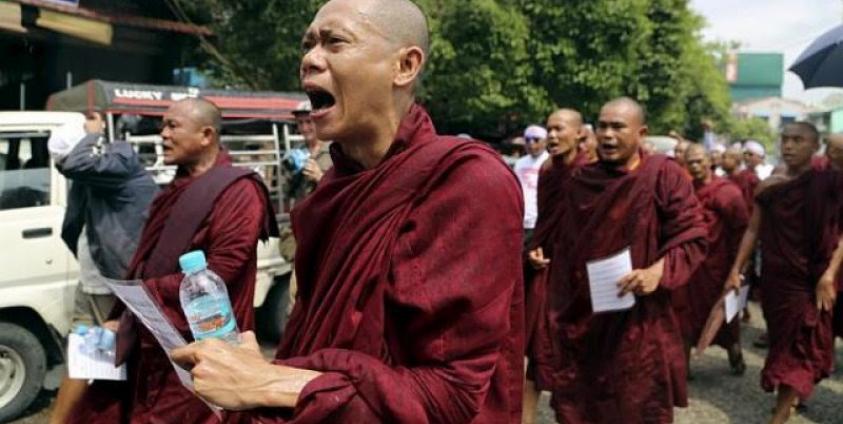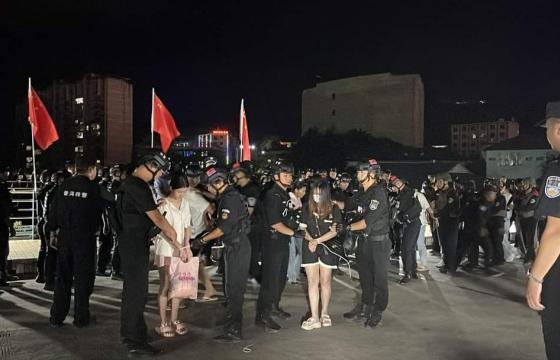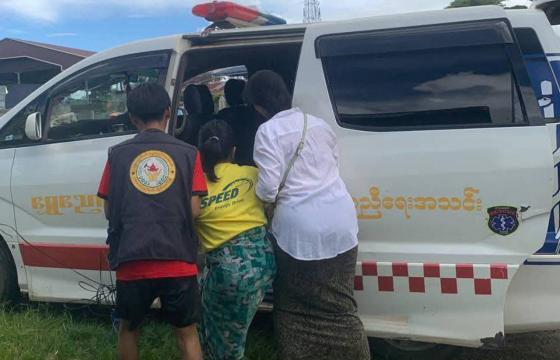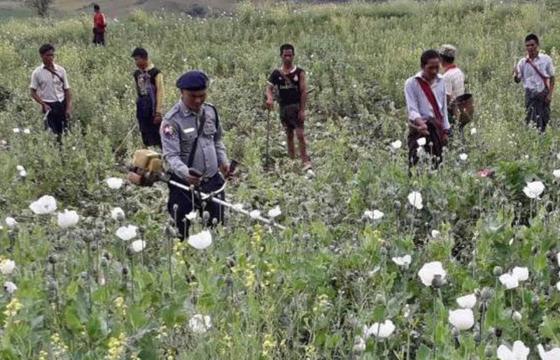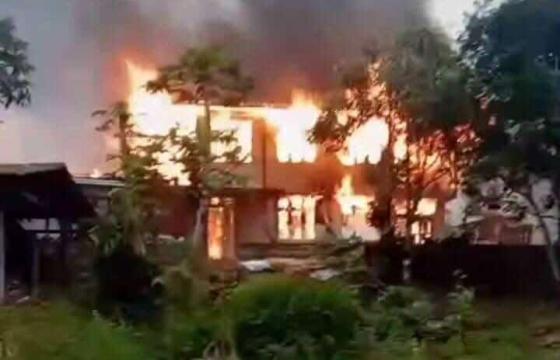When the authorities consisting police and immigration officials detained and interrogated a large number of returnee monks from Sittwe, Arakan State, to prove whether they are connected to the Arakan Army (AA) for nearly twelve hours, the government is showing its concern and angst on the rise of ethno-nationalism among the Arakanese.
On February 16, some 300 monks, who participated in Buddhist Dharma exam known as “Thadana Linkaya Thamanaykyaw” held for the fourth time from February 7 to 10 at Lawka Nandar Jedi compound of Thadana Baikman, were detained and interrogated by the government authorities on suspicion of having connection with the anti-government elements in Arakan State.
On February 9 and 10, 460 monk robes were said to be discovered in a ditch at Maungdaw Township near the border fence demarcation position 36, according to the police announcement reported 7 Day Daily. The robes were suspected for usage by the terrorist insurgents for other purpose and an illegal attempt transportation to the other country side, meaning the Bangladesh, the announcement said.
Accordingly, one of the monk named U Akka Wuntha told the Radio Free Asia (RFA) that the monks were interrogated as they were under suspicion that the AA would come in under the guise of monks.
The monks traveled in seven buses from Sittwe and were stopped at Bago Region Okshitpin and Nawadae checkpoint gates and interrogated before hauling them to Zawtikaryong temple building in the city of Pyi for further interrogation. The duration of the whole episode was said to be twelve hours from 2:00 morning to 2:00 afternoon on February 16.
U Akka Wuntha said the authorities were not satisfied with the monks’ explanation that they were there in Sittwe to do their exam and thus detailed interrogations such as asking for exam question papers and answers that were made as a proof.
Before the release about more than 50 monks were photographed and asked to sign that they have forgotten their identification papers, according to Kyaw Zan Aung who has been accompanying the monks to Arakan State trip for four years.
The authorities’ undertakings were met with disapproval when U Akka Wuntha said: “It is inappropriate. Taunggyi, Myingyan, Mawkyun, Mandalay, Pakokku, Mongywa etc within Myanmar have been holding exams and all have been participating. Nobody ever asks us for identification. We see this as intentionally disturbing (the monkhood).”
Reportedly, there are 14 such examination centers countrywide.
Adding insult to injury, the monks were said to be denied early breakfast, according to the RFA report, although the 7 Day Daily reported the next day that the monks were treated to morning and afternoon meals before allowing them to journey to Yangon. The 7 Day report also contradict the RFA report of 12 hours interrogation to only 8 hours, giving the time from 4:00 in the morning to 1:00 in the afternoon.
The undertaking is strange as exam participants have all submitted all travel itinerary and personal details to the Arakan State government long in advance.
Regarding the authorities’ actions Kyaw Zan Aung, who is also the monk assistance, known as “Kappiya” in Burmese, elaborated: “As soon as the car stopped the monks were interrogated. They were asked in suspicious manner like why they go to Arakan, why they have to return, if exam cannot be taken in Yangon, and why they have to take their exam in Arakan.”
He emphasized: “I have been transporting them to and fro for four years and have never experienced this kind of restrictions.”
In the same vein, Chairman of the Buddhist examination board U Myint Oo echoed his frustration saying: “The Sangha (Buddhist monks) of the whole country could blame (for the episode conducted by the authorities). Besides foreigner Sanghas, such as the Japanese are also involved. If news of these Sanghas’ interrogation in the course of their participation in the exam become known, Myanmar’s portrayal regarding dignity could be affected. That is why we don’t want this kind of interrogation to take place.”
About 70 monks have already left on February 13 for various destinations within Myanmar. It is said round about 500 monks from all over the country, including monks from countries like Japan, Vietnam and Cambodia participated in various levels of the exam.
Given such reactions to the government’s authorities handling of the monks, it could be seen as the inappropriate measures taken on the Sittwe returnee monks basing on the sole phobia that the AA or its sympathizers could infiltrate and deliver destructive blows to the Bamar-dominated areas.
True, not long ago AA leader Tun Myat Naing said something like an eye for and eye and that if the Tatmadaw would lay waste in Arakan State.
He literally told The Irrawaddy in an interview in January: “If the government continues its offensive, the clashes will go on. I heard [government and Tatmadaw officials] say that Rakhine (Arakan) will be completely ruined in the next 10 years or so and that Rakhine will meet the same fate as Syria. So I believe that if they want to destroy our land [Rakhine State], we should destroy their [the Bamars’] land. If they offer peace, we will welcome it as warmly as we can. And we will work actively. If they are to tear our land apart militarily, we will have to do the same to them.”
But such statements might be just physiological warfare and the government authorities should not take it so seriously, provided that they (government security personnel and Tatmadaw soldiers) behave in a civil manner where the Arakan population is concerned.
Instead of such tit-for-tat knee-jerk reactions and ill-thought-out crackdown even on the monk-hood presumably of Arakan origins, as is recently the case, the powers that be should heed the Arakan State legislature urging of February 14 to open up a negotiation process with the AA and end the conflict, showing its broad-mindedness and largesse. At least, this will be the most logical, pragmatic and sensible approach rather than just ordering the annihilation of AA, which now has a huge following due to the rising patriotism and ethno-nationalism among the Arakan people. The elephant is already in the room and it would be illogical to ignore it, as the AA leader rightly pointed out in the interview lately.


